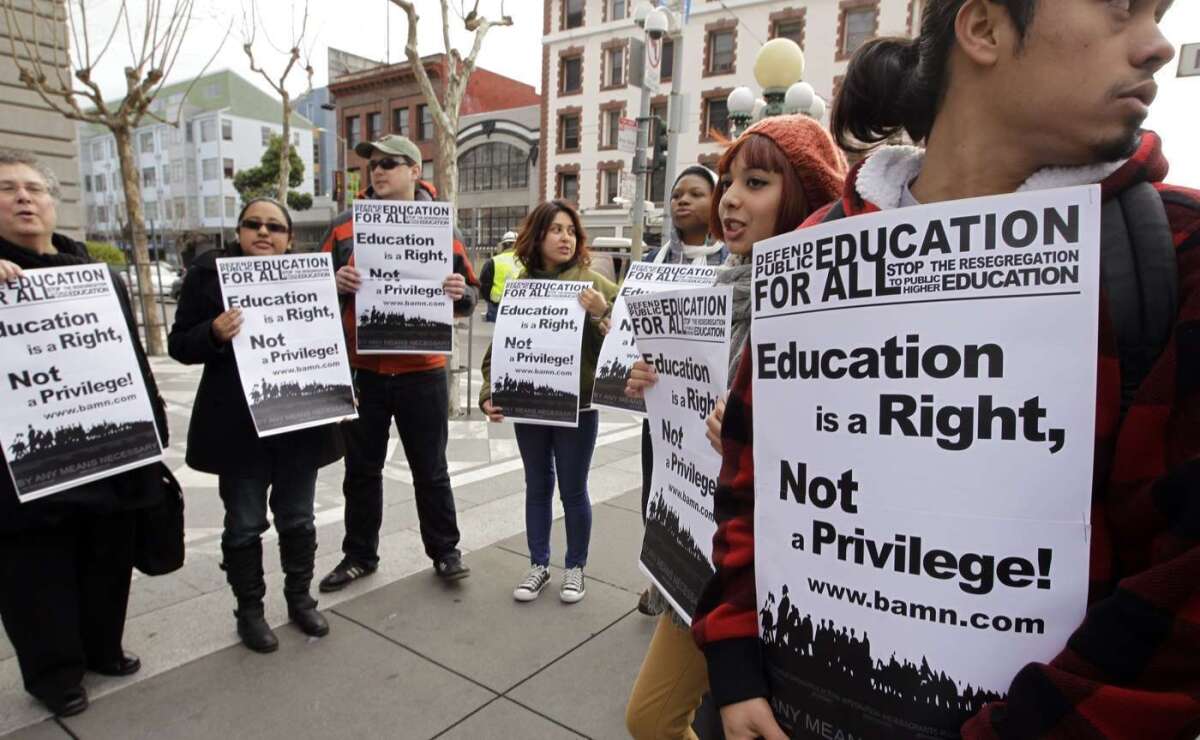Prop. 209’s affirmative action ban drove down Black and Latino UC enrollment and wages, study finds

- Share via
California’s ban on affirmative action has significantly harmed Black and Latino students by reducing their enrollment across University of California campuses, lowering their graduation rates and driving down subsequent wages, a new UC Berkeley study has found.
The study, released Friday, also found evidence that affirmative action before the Proposition 209 ban did not significantly hurt Asian American and white students denied admission to UC’s most selective campuses. That’s because they enrolled instead at universities of comparable high quality and earned similarly high earnings in the following years.
For the record:
2:35 p.m. Aug. 24, 2020A previous version of this article said the UC Berkeley study found evidence that Proposition 209 did not significantly hurt Asian American and white students. The study found that affirmative action before the Proposition 209 ban did not hurt them.
“This study presents several complementary pieces of evidence that suggest that the benefits provided by affirmative action to Black and Hispanic Californians prior to Prop. 209 substantially exceeded the costs faced by white and Asian Californians, and that those costs may have been quite small,” said Zachary Bleemer, the study’s author and a research associate at UC Berkeley’s Center for Studies in Higher Education.
The findings come as California voters weigh whether to support Proposition 16, a proposed constitutional amendment on the Nov. 3 ballot that would repeal the 24-year ban on preferential treatment in public education and employment based on race, ethnicity or sex.
In June, the UC Board of Regents unanimously supported a repeal of Proposition 209, amplifying the sweeping support within the university system to restore affirmative action. Then-UC President Janet Napolitano, all 10 campus chancellors and the governing bodies for faculty, undergraduate and graduate students all expressed support for the repeal effort.
The proportion of underrepresented groups — commonly defined as students who are Black, Latino, Pacific Islander or American Indian — dropped from 20% in 1995 to 15% in 1998, the memo said. Asian Americans and whites increased their share.
Supporters of the repeal effort hailed the study for providing clear empirical evidence about Proposition 209’s harmful effects on the state’s most underserved students. But opponents, including some Asian Americans, say they are troubled by a return to what one called “racial favoritism.”
Bleemer found, however, that Asian Americans and whites were not significantly disadvantaged by affirmative action nor particularly benefited from its repeal. He tracked more than 200,000 UC applicants between 1996 and 1999 to see whether they were admitted, where they ultimately enrolled and their academic outcomes. Bleemer also tracked the applicants’ wage earnings through their early 30s.
The study found that Proposition 209 did harm Black and Latino applicants. About 1,000 fewer Black and Latino high school seniors annually applied to UC campuses after the ban took effect and those who did apply were significantly less likely to win admission and enroll at them. Many of them were “cascaded” down from top-rated campuses into less selective ones both in the UC system and elsewhere, such as the California State University system.
That, in turn, led to a decline in the attainment of both undergraduate and graduate degrees, the study found.
Those findings counter arguments that students with lower grades and test scores do better at less selective campuses rather than being “mismatched” with more competitive ones. Their attainment of degrees in science, technology, engineering and math fields did not improve at less competitive campuses. And their academic outcomes were stronger at more selective campuses — possibly because they received more support there, Bleemer said.
In addition, Bleemer found that Latinos who were funneled to less selective campuses after Proposition 209 earned about 5% lower average annual wages than their counterparts who were admitted to more selective campuses before the affirmative action ban. Black college graduates, however, did not show a similar decline in earnings; Bleemer was unsure why but noted that more Black applicants denied admission to selective UC campuses ended up enrolling at Ivy League schools.
Bleemer said Proposition 209 set off the most massive reshuffling of college students in U.S. history, as it upended the admissions process for hundreds of thousands of students in both the UC and CSU systems.
“Suddenly all of these universities stopped using this policy. It seemed like a great opportunity to understand what affirmative action was doing for thousands of students in California. And the answer looks pretty bleak for those students,” he said.
More to Read
Sign up for Essential California
The most important California stories and recommendations in your inbox every morning.
You may occasionally receive promotional content from the Los Angeles Times.











